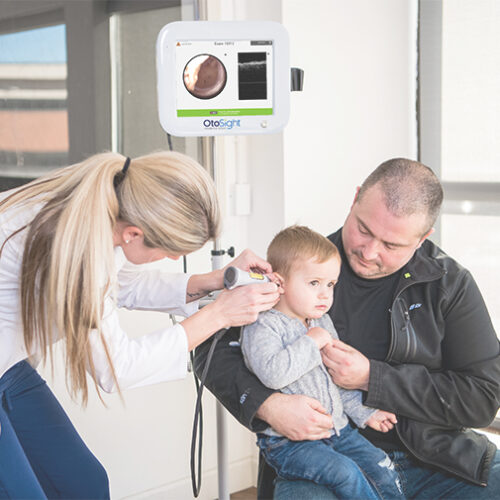Phone
866-411-EARS
Address
PhotoniCare Inc.
2800 Meridian Parkway, Suite 175
Durham, NC 27713

Published on February 7, 2018 on Optics.org
Startup winners: Orbis’s Simpson (3rd) ; Clearview’s Castel (2nd) ; and PhotoniCare’s Shelton (1st). Photo Credit: SPIE/Doug Cody, Bay Area Event Photography
PhotoniCare wins Startup Challenge with pitch for non-invasive ear inspection. CareWear and Orbis take second and third in new-product pitch contest at SPIE Photonics West.
PhotoniCare, a spinout of the University of Illinois at Urbana-Champaign (UIUC), which has developed a handheld, low-cost imaging platform for medical applications such as inspecting the eardrum, was named the winner of the 2018 SPIE Startup Challenge, last week during Photonics West in San Francisco.
The ClearView [OtoSight Middle Ear Scope], the first product on the Photonicare platform is described as “being able to fundamentally change the way physicians manage middle ear infections, one of the most common diseases in the world”.
Founded out of Dr. Stephen Boppart’s bioengineering research lab at UIUC, PhotoniCare, led by CEO Ryan Shelton, is continuing its relationship with UIUC as an EnterpriseWorks incubator company.
Shelton said, “PhotoniCare was founded in 2013 out of a shared passion to make a real impact on the health of children. Our mission is to revolutionize healthcare by providing physicians with better diagnostic tools, given that many diagnostic techniques at the frontlines of medicine have significant shortcomings.”
During his pitch, Shelton told the crowd and the judges, “We started with middle ear infections because of our personal experience with this disease as both parents and patients. Our novel application of optical coherence tomography revolutionizes the diagnosis, treatment and monitoring of the middle ear infections that affect 80% of children.”
In second place was CareWear, whose presentation was made by its CEO Chris Castel. Its novel photonics-based technology is called CareWear Firefly – a wearable therapeutic light delivery system which can help various medical procedures such as injury treatments.
Castel said, “CareWear develops wearable therapeutic devices for medical professionals and consumers. Our team is devoted to making it easier for consumers, patients and providers to incorporate innovative, wearable medical technology during their daily activities.”
In third place was Orbis Diagnostics, whose “Point of Cow” diagnostics approach enables dairy farmers to innovate by providing key data about core business – producing the best quality milk from the healthiest animals in the most sustainable way. Orbis is headed by Dr Cather Simpson of the University of Auckland, New Zealand.
She commented, “We are developing in-line milking measurement for protein, fat, somatic cell and progesterone. Dairy farmers need to determine ratios and concentration of milk solids, for which they are paid, detect early signs of bovine mastitis through somatic cell counts; and improve reproduction through progesterone monitoring.”
Orbis’ microfluidic technology is expected to measure more parameters, be more accurate and timely than existing practices, providing farmers with actionable insight for each cow in their milking herd.
The other shortlisted finalists were C. Light Technologies, CarNanny and Vitrum 3D.
C. Light Technologies has developed the Neuro-Deficit Screening and Therapy Guidance Tool, a fast and accurate retinal eye-tracking tool designed to help doctors detect the mildest of neuro-deficits.
Vitrum3D develops specialty resins for 3D printing of transparent fused silica glass.
CarNanny is developing a “smart” baby car seat fitted with optical sensors that serves as an “internet of baby things” about the well-being of a baby.
Prize-winning
The contest provides $85,000 in cash prizes and other awards, and is supported by Jenoptik and sponsors Edmund Optics, Trumpf, Open Photonics, and the US National Science Foundation. Jenoptik sponsored the cash prizes including $10,000 for first place, $5,000 for second place, and $2,500 for third place. The first-place winner also received $5,000 worth of products from Edmund Optics.
“The breadth and business potential of the finalists was really impressive” said Jay Kumler, President of Jenoptik Optical Systems, after the final round of pitches on February 1st. “All of the finalists should be congratulated on the exciting companies that they have launched.” SPIE President Glenn Boreman added, “These entrepreneurs are doing the hard work of bringing these technologies out of the lab so they can benefit the public.”
The SPIE Startup Challenge is held annually at Photonics West, the world’s most comprehensive technical conference and exhibition spanning biophotonics for brain research and healthcare, lasers for research and advanced manufacturing, sensors and camera systems, imagining and displays, communications and optoelectronics, plus the core optical components that enable many of today’s consumer products.

Originally published by WRAL TechWire by Bryant Haskins, NCBiotech writer… Read More

Champaign, Ill. – December 20, 2021 – PhotoniCare, Inc.—a company… Read More

The Northwest Arkansas Tech Summit declared Ryan Shelton, CEO and… Read More